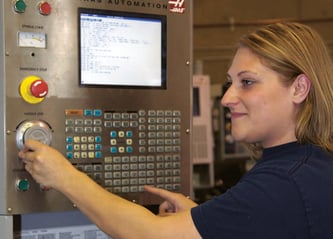
The manufacturing industry has been transforming with the rise in new digital industrial technology, known as Industry 4.0. Technology is changing many stages of production, increasing productivity, optimizing operations, and unlocking new areas of growth. In order for manufacturers to capture the value this technology unlocks, they need to ensure their workforce has the right skills and the right tools. With the rise in new industrial technology, many employers have identified a skills gap especially in frontline workers who deliver products and materials, drive product quality, and keep critical equipment running.
Effects of the Skills Gap
The effects of the skills gap in advanced manufacturing are all too familiar, and have been plaguing the industry for some time, such as:
- Finding qualified (skilled) employees for open positions
- Creating a flexible work force (skilled on multiple machines)
- Lacking defined career paths that promote growth (skill sets/competencies)
- Limiting business growth (more automation) due to lacking technical support
Why is it imperative to address these skills gaps today? America has seen production and availability of products come to a halt this last year due to disruptions created by shutdowns around the world. It is clear that the US still needs to do certain critical manufacturing and production functions onshore.
These shortages of necessary skills are compounded as companies seek to grow and expand operations. In fact, Deloitte and the Manufacturing Institute had estimated that up to 2.4 million US manufacturing jobs could remain unfilled through 2028 due to a lack of adequate skills. This deficit could cause US manufacturers to lose nearly half a trillion dollars by 2028.
 Addressing the Skills Gap
Addressing the Skills Gap
For many companies processing metal and plastic parts (as well as consumer packaging), automation and robotics are leading the way in solving the labor gap. As manufacturers implement technologies that transform how people and machinery work together, new training processes are required. Together we can address the skills gap for companies that have adopted automation technologies and help them achieve higher production rates with fewer injuries and absences.
When companies start to pursue training for automation technicians, they quickly realize that training resources are somewhat limited. They now realize that a unique set of skills are required: these skills fall between an existing front-line automated machine operator and the Manufacturing Engineer or Engineering Technician. So how can manufacturers train their workforce on up-and-coming technologies required to remain both productive and competitive? Employers need to provide effective training that encourages workers to easily access information online and apply that information in practical, hands-on activities that reinforce their learning.
Remember the old adage, “Work smarter not harder”? Advanced manufacturing technologies do not replace jobs. Instead, automation takes out the laborious and redundant tasks from the operator, allowing for process oversight and operators to execute work not suited to automation.
But the question still remains, where do I find training for my employees? In response to local industry needs, Clackamas Community College has developed a series of workshops to address competencies identified through a council of local advanced manufacturing employers. The curriculum is designed to address the immediate needs of a Frontline Automated Machine Operator. The types of interfaces covered include material handling, machine tending, and robotics. Companies will appreciate less down time and fewer calls for maintenance when machine operators have troubleshooting skills to resolve alarms and reset operations. Workers will appreciate the better work-life balance that automation will bring to their daily lives.
Productivity increases with skills gap Fulfilment
Let us progress our ability to supply the world with US products by building back our advanced manufacturing capabilities. This rebuilding can be addressed with automation in mind at every step. By upskilling the workforce to utilize automation and robotics, we can realize the productivity increases needed to meet current and future demands. This will also position onshore manufacturing in the US to be a competitive new choice for international supply chains. However, it will take a significant effort to upskill America's workforce. To learn how Clackamas Community College can help you address opportunities with our Frontline Automated Machine Operator program, contact us today.